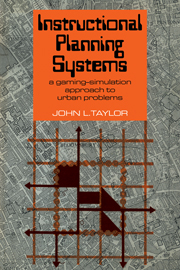Book contents
- Frontmatter
- Contents
- List of figures, tables and forms
- Acknowledgements
- 1 Point of departure
- 2 The basis for discussion
- 3 The genesis of an approach
- 4 Selected planning developments
- 5 Impact, pitfalls and pay-offs
- 6 A gaming-simulation rationale
- 7 Simulation in practice
- 8 The way ahead
- Appendices
- Bibliography
- Index
4 - Selected planning developments
Published online by Cambridge University Press: 07 May 2010
- Frontmatter
- Contents
- List of figures, tables and forms
- Acknowledgements
- 1 Point of departure
- 2 The basis for discussion
- 3 The genesis of an approach
- 4 Selected planning developments
- 5 Impact, pitfalls and pay-offs
- 6 A gaming-simulation rationale
- 7 Simulation in practice
- 8 The way ahead
- Appendices
- Bibliography
- Index
Summary
Instructional simulation systems currently being evolved to study the urban process have been seen to have their origins in a number of streams of intellectual endeavour. Drawing freely from these precedents, during the last decade, the planning profession and related disciplines have sought to develop gaming-simulation procedures as instructional instruments for a variety of reasons and functions. It is the historical documentation of such investigations that is the concern of this chapter. But before turning to this task, it must be explained that a comparable chronicle of planning game development is not known to the writer and what overview material is available is first identified.
GENERAL OVERVIEW MATERIAL
There is a paucity of literature attempting to trace the development of planning and related urban affairs games which Taylor (1969), Twelker (1969) and Werner and Werner (1969) have shown is by no means typical of the application of gaming-simulation techniques to other areas. This investigation has already identified extensive source material concerned with military, social science and educational gaming-simulations and has drawn attention to the wealth of business simulation literature. Thus, part of the rationale behind this investigation was to establish an overall view of the growth of a seemingly neglected branch of instructional simulation in an attempt to fill a gap in contemporary planning knowledge.
- Type
- Chapter
- Information
- Instructional Planning SystemsA Gaming-Simulation Approach to Urban Problems, pp. 33 - 53Publisher: Cambridge University PressPrint publication year: 1971



